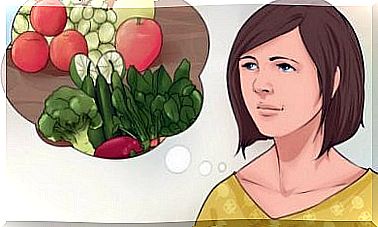8 Vegetables That Cause Allergy
There are vegetables that cause allergies because some people have an antibody called IgE that causes these reactions. This antibody can be released even if the vegetables have been previously consumed.
In a study called Alergológica 2015, conducted in Spain, it was shown that 7.4% of people seek an allergist because they have allergies to pollen, fruits and vegetables.
In addition, allergy symptoms vary, are of different intensities, and affect one or more organs of the body.
These symptoms can appear if the person consumes this type of food, whether natural or processed.
It should be taken into account that not everyone reacts in the same way to different food compounds . Every body is different, and what affects one person may not necessarily affect others.
That’s why today we bring you a short list of those vegetables that cause allergies. Check out.
8 vegetables that cause allergy
1. Carrot

Even if you don’t believe it, this is one of the vegetables that causes allergies in some people. If you’re allergic to pollen, you’re probably allergic to carrots.
This happens due to the structural similarity of its components. The proteins in pollen are similar to those in carrots.
The allergic proteins in carrots do not disappear even if we cook them. The culprit is an inhalant allergen that cross-reacts with carrots.
Among the most common symptoms we find:
- Anaphylaxis (difficulty breathing, low blood pressure and loss of consciousness)
- increased heart rate
- Anxiety
- Confusion
- nausea
All of these symptoms can lead to a coma and, in some cases, death.
They appear quickly soon after ingestion of the vegetable, which is why immediate medical attention is needed.
I did not know? 6 benefits of consuming carrot and ginger juice
2. Lettuce
Lettuce is one of the foods most closely related to the lipid transfer protein syndrome. Ingestion of this vegetable is a frequent cause of allergy.
- Lettuce also produces anaphylaxis, and you should be more careful with its ingestion because of the different pathogenic bacteria found on its leaves, which can cause disease.
However, even if we are not allergic to it, in any case we must disinfect vegetables carefully, with boiled water or vinegar, in order to eliminate these bacteria in a radical way.
3. Celery

This allergy is common, as this vegetable contains an allergen similar to birch pollen. Raw or cooked celery can cause reactions ranging from dermatitis to anaphylaxis.
In addition, ingestion of this vegetable and exposure to ultraviolet radiation can produce:
- Phytophotodermatitis
- laryngeal edema
Even though the reactions of celery in humans have not been well studied, it is recommended that, if you present these or other unfavorable symptoms, you should stop using it.
See also: 7 changes you’ll notice in your body when you follow the celery diet for 20 days
4. Spinach
This is one of the most common allergy-causing vegetables. This is because it is rich in histamine, a chemical that acts in the body as a hormone and neurotransmitter.
Histamine is found in spinach, and this is released in large amounts in inflammatory processes, which is why it is one of the main causes of allergies.
5. Onion

Onions contain a specific mineral (sulfur) that strengthens circulation, but in cases of allergy, this mineral is one of those responsible for these reactions.
Thus, onion allergy symptoms appear immediately and include:
- Nausea
- vomiting
- Diarrhea
- stomach cramps
- Urticaria (also by contact)
- Inflammation of the airways
- Anaphylaxis (in some cases)
6. Garlic
Even though there are few recorded cases of this allergy, they do exist. For some individuals the symptoms are very mild, while for others they can be deadly.
Thus, the most common symptoms of allergy to this vegetable are:
- skin irritation
- Tongue swelling and some cases of the glottis
- Abdominal pain
- Diarrhea
- Nausea and vomiting
- anaphylaxis
7. Condiments

Pepper, mustard, curry, cumin and aniseed, for example, are also causes of allergies in some people.
These are a little more difficult to diagnose as they often come in the form of mixtures, and there are few samples that are reliable.
Thus, among the possible symptoms we find:
- rhinitis
- Asthma (if inhaled)
- Skin reactions (eczema)
- Conjunctivitis
If you don’t regularly consume these condiments and don’t know if you’re actually allergic to them, it’s best to avoid them or consume them in small amounts.
8. Asparagus
Asparagus, together with onion and garlic, belong to the Liliaceae family .
In a study carried out on allergy to asparagus, it was shown that individuals who had contact, inhaled or ingested this vegetable suffered symptoms of:
- rhinitis
- Bronchial Asthma (by inhalation)
- Urticaria (contact eczema)
- anaphylaxis
So, if you have never consumed this vegetable and suffer any of these symptoms, it is necessary to seek medical attention immediately.
This way you can prevent these symptoms from getting worse over time.









